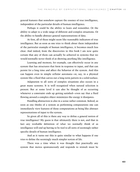general features that somehow capture the essence of true intelligence, independent of the particular details of human intelligence.
Perhaps it could be the ability to learn and remember. Or the ability to adapt to a wide range of different and complex situations. Or the ability to handle abstract general representations of data.
At first, all of these might seem like reasonable indicators of true intelligence. But as soon as one tries to think about them independent of the particular example of human intelligence, it becomes much less clear. And indeed, from the discoveries in this book I am now quite certain that any of them can actually be achieved in systems that we would normally never think of as showing anything like intelligence.
Learning and memory, for example, can effectively occur in any system that has structures that form in response to input, and that can persist for a long time and affect the behavior of the system. And this can happen even in simple cellular automata—or, say, in a physical system like a fluid that carves out a long-term pattern in a solid surface.
Adaptation to all sorts of complex situations also occurs in a great many systems. It is well recognized when natural selection is present. But at some level it can also be thought of as occurring whenever a constraint ends up getting satisfied—even say that a fluid flowing around a complex object minimizes the energy it dissipates.
Handling abstraction is also in a sense rather common. Indeed, as soon as one thinks of a system as performing computations one can immediately view features of those computations as being like abstract representations of input to the system.
So given all of this is there any way to define a general notion of true intelligence? My guess is that ultimately there is not, and that in fact any workable definition of what we normally think of as intelligence will end up having to be tied to all sorts of seemingly rather specific details of human intelligence.
And as it turns out this is quite similar to what happens if one tries to define the seemingly much simpler notion of life.
There was a time when it was thought that practically any system that moves spontaneously and responds to stimuli must be




